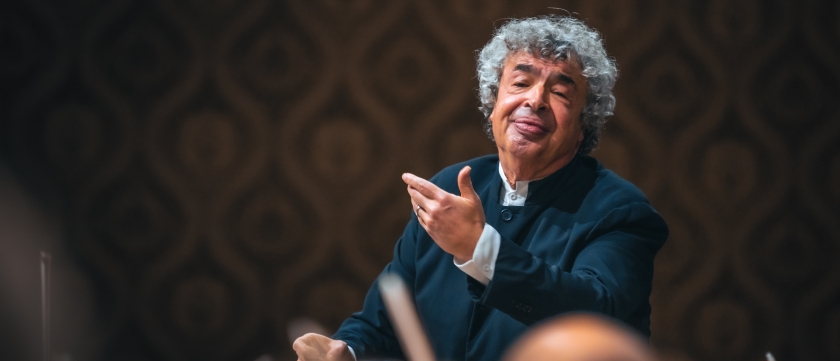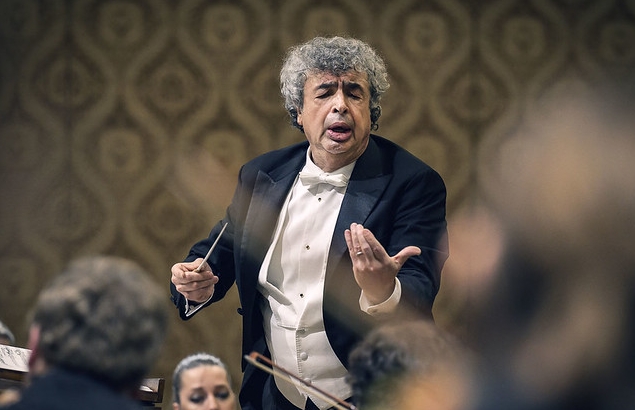We first spoke together two years ago when we did a big interview for the magazine Reportér. We talked about his childhood and growing up, about milestones in his life and his career, his emigration, how a person’s values are shaped, and about music, of course. At one point, when he was talking about auditioning for the Leningrad Conservatoire, I had to interrupt Semyon. Although I knew that he was accepted as a student, the suspense was too much for me.
“Semyon, please tell me that this turned out well because I can’t stand the suspense”, I said. Semyon laughed and promised a happy ending, so I let him continue. And as I was leaving the Rudolfinum after an interview lasting two and a half hours, I asked myself why we hadn’t had more time. It was no different this time around.
Semyon, we are doing this interview for your 70th birthday. Do you see that as a milestone? Or as a chance for retrospection?
I already noticed a few decades ago that birthdays that end with a zero don’t mean anything. Life afterwards is just as it was before, and the changes take place in between. I remember talking with my father, who was nearing the end of his life. “Dad”, I said, “I still feel like I’m fifteen. Isn’t that odd?” And my father answered: “No. It’s the same with me.”
So you have never been drawn to the tendency to look back and take stock in connection with a round-numbered birthday?
They say 40th birthdays are hard for women, while it’s hard for men to turn 50… I have seen men go into hysterics when they turned 30. No, I don’t have such a disposition. Really, the last time I took stock was when I was 15.
So, let’s set birthdays aside. There still must have been moments in your life that you regard as milestones. That evening in Leningrad, for example…
Yes, that evening when I was twelve, when my father took me for a walk through the darkened city streets and told me the truth about the Soviet Union. The whole thing was built on lies. He told me I shouldn’t believe anything that was said. That really was a milestone, as was my departure from the USSR eleven years later. And that incident with the wonderful pianist Vitaly Margulis, which took place not long afterwards in Rome.
What happened?
When I emigrated from the USSR, I had a hundred dollars in my pocket. Back then, that was the maximum one was permitted to take out of the country. And to be honest, even if that had not been the case, I would not have had more than that. There were all kinds of fees connected to leaving the country, and I had been living on bread and potatoes for three years to save up the money. From Leningrad I went first to Vienna, and ten days later, from there to Rome.
Margulis was already there, having emigrated a few months earlier. Until that time, we were mere acquaintances. He had been a professor at the Leningrad Conservatoire when I was studying there. I remember him coming backstage to greet me when I won the Rachmaninoff Competition in 1973. He was very cordial, which made a big impression on me. But it was in Rome that we became friends.
Once he was invited to Freiburg to teach a masterclass at the Hochschule für Musik. When he returned to Rome, some friends and I went to the train station to welcome him like a hero; his masterclass had been so successful that he got an offer of a professorship in Freiburg. That evening, there was a big party at his flat in Lido di Ostia. I arrived late, and the party was already underway. Everyone was starting to get really drunk. Margulis took me aside to tell me how it had gone in Germany. All of a sudden, he took a 20-dollar banknote out of his pocket and tried to give it to me. Of course, I absolutely could not accept it; I refused over and over again until he told me almost with tears in his eyes: “Semyon, I had the fortune to earn five hundred dollars in Freiburg in one hour. And I want to share part of it with you. Tomorrow, somebody else will need your help. You’ll help him, and that way it will eventually find its way back to me.” At that point, I could no longer refuse because there was a deep message in all of this.
But that was still an early milestone when you were twenty. What about the later ones?
There have been so many in my career and in my personal life. Like when I met Marielle, my second wife. That was a very complicated, even dramatic moment in my life; I was married, after all, and I had children. I had to make a difficult decision. So, I followed my heart, and I have never regretted it. But the truth is that nearly anything can be a milestone. Every concert is a milestone in a way. Either it hits you on the head, or you get a kiss.
And what is some of the most valuable advice you have received in your life? I mean the kind of advice that shaped your future.
There has been so much. But I recall one piece of advice from Wolfgang Stresemann, a German conductor and composer, who was the intendant of the Berlin Philharmonic when I made my debut there in 1985. Stresemann was an amazing man. He was born into an aristocratic family. His father was the foreign minister during the Weimar Republic and won the Nobel Peace Prize. Wolfgang studied conducting, and when the Nazis came to power, he left for America and, for a while, wrote concert reviews. In the mid-1950s the German government asked him to come back and serve as the intendant of the Berlin Philharmonic. After the concert, when I came backstage, he gave me a key piece of advice. “You must be listening ‘into’ the orchestra all the time”, he said.
What exactly did he mean by that?
I have to hear every single player in the orchestra. And not just hear, but also listen. There is a big difference. After all, in life we must also hear and listen. That’s the only way we can truly understand what people are saying.
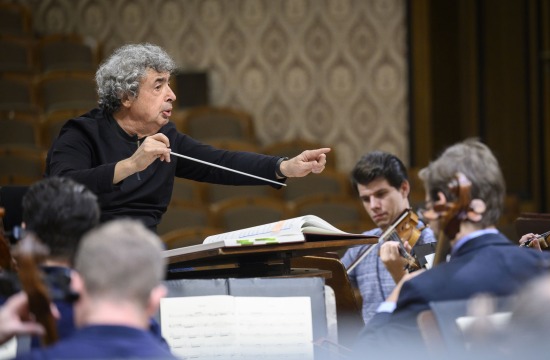
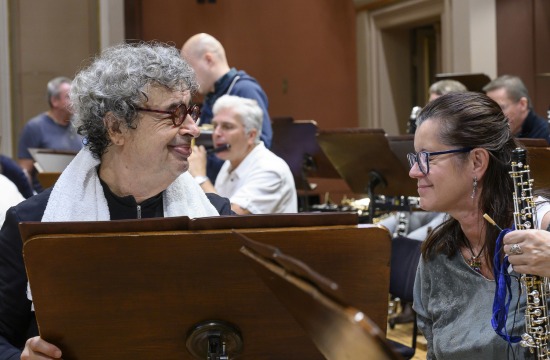


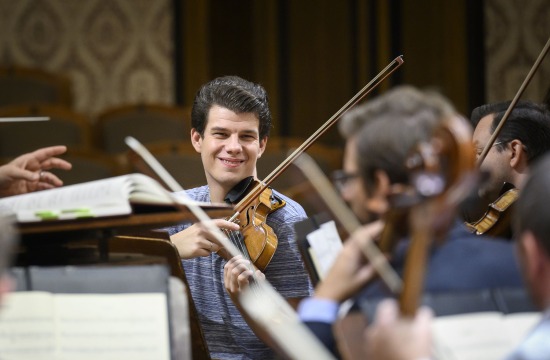
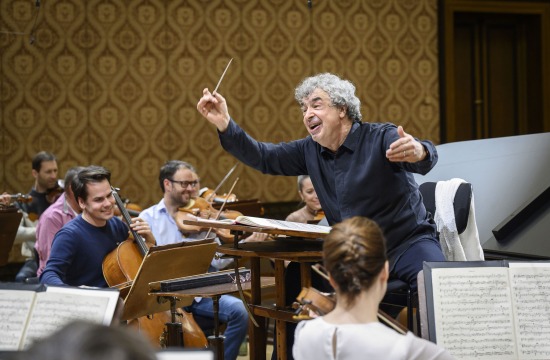
Even Semyon Bychkov the child would have given you rather simple advice. It’s all about the values that we profess in our lives. It makes no difference whether I am a conductor, a journalist, or a lorry driver. We need to know our values, and we have to stand up for them resolutely. A poem by Vladimir Kornilov in which he says that being true to oneself takes the greatest courage in the world, has stayed with me all my life.
Why else would I be doing this?
Recently I saw your concert performance of Rusalka, which was breathtaking. And it occurred to me that you have been living with music, in music, since your early childhood. Does music do something to you physically?
You have answered your own question. If music did not do anything physical, Rusalka would not have seemed breathtaking to you.
And what about standing ovations like after Rusalka—what effect do they have on you.
I always think that the seats are so hard that people need to stand up after the concert! (laughter)
I can imagine that at the beginning of one’s career, standing ovations are something absolutely incredible. But can one sustain that feeling of joy even after so many years?
It is not just possible; it is absolutely essential. How could I not be overjoyed when people get up out of their seats after a concert? Why else would I be doing this? I could stay at home and love music just as much. But I’m here to share it with others. That is quite natural, and there is no strenuous effort involved.
You are known for thinking deeply about music, and before every project you take in an enormous amount of information. Tell me, is music still able to surprise you?
Absolutely! Every day. There is so much there in the music, even in something I have conducted a million times. Music is a nearly inexhaustible source of learning and discovery. Love is the best analogy for someone who is not a musician. When you are in love with someone, what makes that feeling permanent? The fact is that no matter how long you know someone, or how well, there are still things you don’t know about them. Music is just like that. And music never betrays you. We may approach it, perform it, or receive it differently, but music remains music.
That brings me to another question. Is classical music something that we tend to regard as a kind of safe harbour? The world around us is changing at an insane pace, and things are happening that we might not have expected or wanted. Music, as you say, is something safe, something that will not betray us. The world of classical music seems to be unchanging. The best things are two hundred or three hundred years old. Is this true, or is the world of classical music changing as well?
It is changing. The way that music is received, one might say consumed, the way it is produced, is sometimes like an assembly line. Technology has developed so that nearly anybody can record anything. You can turn on a smartphone with a good microphone, record something, and publish it on YouTube. You know, some changes are truly amazing; technologies bring so many unexpected, fantastic opportunities. But just as Kornilov’s poem says, there are values that must remain unchanged. I’m lucky to be able to restrict myself to conducting music and orchestras with which I have deep, harmonious connections. But I had to work my way up to that. Nobody gave me that for free.
Two plus two equals no more than five
This September you began your fifth season as chief conductor of the Czech Philharmonic. At the same time, you announced that you have signed another five-year contract. Obviously, you do not regret having come here. What is it like working with the top Czech orchestra?
The reasons that I agreed to work in Prague, of course, are the beauty and tradition of the orchestra, as well as the environment in which it plays, by which I mean both the Rudolfinum and Prague. That is clear. What I did not expect, however, was how quickly the orchestra would transform itself into an ensemble that conveys pure beauty, one that is self-assured, tremendously powerful in its expression, and precise in its rhythm. The rhythmic precision is probably what surprised me the most. You see, Slavic music education is based on the melodic aspect of music. Slavs are incredibly sensitive to melody, but they are less precise as far as rhythm is concerned. It reminds me of an old Jewish joke. Children are learning arithmetic. The time comes for them to be tested, and the teacher asks little Moishe how much two plus two equals. “Seven”, says Moishe. And the teacher says: “Look here, my boy! We’ve been working on this for months! Everybody knows that two plus two equals four. Five at the most. But seven?”
And Slavs are a bit like that when it comes to rhythm. But getting back to working with the orchestra… Let me tell you something that happened just this week. We were rehearsing something by Shostakovich. The orchestra did not know the work, but everyone had prepared very carefully. They are very aware of what is difficult, and this Shostakovich work is truly difficult. And we were rehearsing on and on, and it was difficult, and at one point I told them: “You know, I can’t imagine an orchestra that could give better expression to this work. This isn’t the first time I’ve had that feeling, and it needs to be said.”
And how did they react?
Nothing. They never say anything. They smile, then they go home and think it over. (laughter)
How is the atmosphere in the orchestra now? I noticed at the opening concert that the players are laughing and talking together.
That’s a fact, and it’s not just Jan Mráček! It is my belief and hope that the orchestra is happy. They like being together, and they gather even after work. After a concert in San Sebastian we had a party in a restaurant, and they were wonderful. By the end, they were singing and dancing. It was wild. I really loved it! When I came to the orchestra, I was unaware of this side of their personality, and I’m convinced that this has something to do with the Czech mentality. The French can catch fire with happiness, but ten minutes later it has changed. Italians are like that, too. In this country, people are more reserved, quieter. They hesitate for a long time before sharing their opinions with an outsider. But then when it clicks, it stays that way because it is genuine.

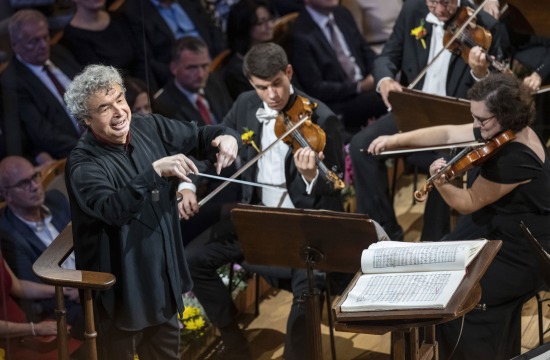
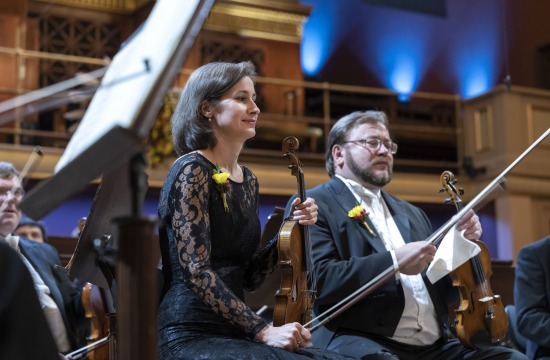

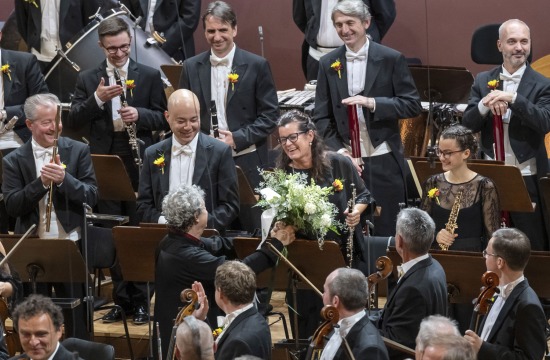

I can’t choose just one. Every project is different. In general, the better the orchestra knows the music, the more open and relaxed the players are. You mentioned Rusalka. That was a big deal. The players knew it, of course. They were born and raised with it. But they didn’t know the score all that well. It had been about twenty-five years since they last recorded it. And it’s an opera, so it has to be played differently from a symphony. The players have to be sensitive to the singers’ voices, have to listen for variations, understand the words, and read between the lines. It demands much more knowledge.
What was performing Rusalka like for you?
It was one of the happiest moments of my musical life. I must tell you that some years ago I went to hear Rusalka at an opera house (I won’t say where). I sat in the first row of the balcony and listened, and I was terribly bored. Not long afterwards, I got a recording of Rusalka and put it on, and within just a few bars tears welled up in my eyes. The very same work was evoking completely different emotions in me.
What does Rusalka mean to you, personally?
That struck me the first time I read the libretto: we should never wish for things we should not have.
So Rusalka is not about the fickleness of men and the naivety of women?
No. In the end, they all lose. Why? Because they wanted something they were not meant to have!
A person without a soul is just a tourist
What are you planning next for the Czech Philharmonic?
Now I’ll tell you something I haven’t told anyone else yet. We agreed recently with the orchestra’s management that I’ll be spending sixteen weeks a year with them. In the end, this has always worked out to something more like twenty weeks. And now the important information: I don’t intend to change anything about this! (laughter). Sometimes I feel a bit sorry for the players who have to see me here, and not somebody else!
We’ve already talked about this a bit, but I’ll ask anyway. What has the Czech Philharmonic learned from you, and what have you learned from them?
I’ll answer with another story. One thing that affected me greatly was the Beethoven Violin Concerto with the soloist Lisa Batiashvili. The players were incredibly attentive, both to each other and to Lisa. They perfectly mirrored everything she wanted and needed. They are like a team, all going in the same direction, and every note matters. And what have I learned from them? They have shown me the authentic soul of the Czech music I am conducting. You know, there is no such thing as a one-and-only perfect, correct interpretation. The important thing is authenticity. The soul. If that’s missing, you’re just a tourist.
To conclude, I have a question not about music. We are living in peculiar times that are unfavourable in many ways—the pandemic, the war, climate change, the energy crisis… There is great uncertainty. Is there anything that gives you hope?
How long has humanity been debating over whether our planet has ever been visited by aliens? I’m convinced that they have already been here, but once they found out what we are like and how we live, they flew away as fast as they could. But seriously. Every crisis is also an opportunity to learn and to start doing things better. We just have to recognise the opportunity and, of course, that doesn‘t always happen. But you know what they say about hope. That it’s the last thing to die.
